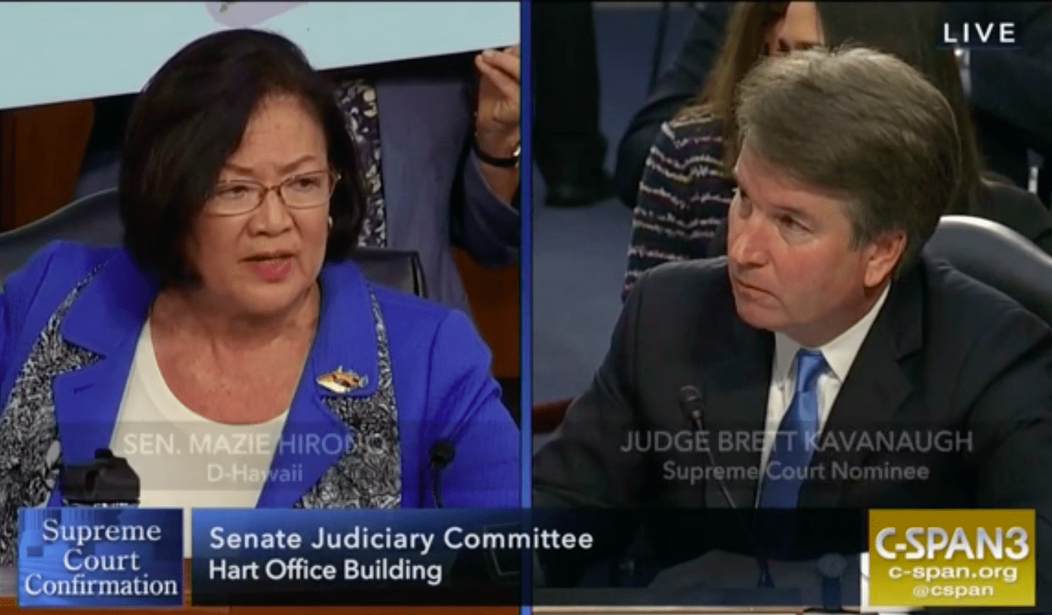Sen. Mazie Hirono (D-Hawaii) used her time to smear Judge Brett Kavanaugh, President Donald Trump’s second Supreme Court nominee, as an accessory to sexual assault, a racist against native Hawaiians, and an enemy of the “little guy.” Her thirty minutes of “questions” constituted a sustained vitriolic attack on Kavanaugh’s character, with very little direct relevance to his record as a judge.
First, Hirono launched into a #MeToo witch hunt against Kavanaugh, attempting to trap him on the issue of sexual assault. She didn’t quite ask why he beat his wife… but she came close.
Right out of the gate, the senator asked him, “Since you became a legal adult, have you ever made unwanted requests for sexual favors or committed verbal or physical harassment or assault of a sexual nature?”
The senator explained, “I started asking these questions about sexual harassment because it’s so hard to hold lifetime appointees to the federal bench accountable, and because I did not want the #MeToo movement to be swept under the rug.” Uh huh…
She then launched into an assault about the allegations regarding Judge Alex Kozinski, a 9th Circuit judge who resigned after 15 women came forward with long-running accusations of sexual harassment and assault during the height of the #MeToo movement.
Kozinski and Kavanaugh had a longstanding relationship, Fox News reported. Kozinski advocated for Kavanaugh in 2006, when the now Supreme Court nominee was appointed as a federal judge. Kavanaugh formerly clerked for Kozinski, and Kozinski enabled him to become a clerk for Supreme Court Justice Anthony Kennedy. Kavanaugh hired Kozinski’s youngest son as one of his clerks.
Kavanaugh said news of the #MeToo allegations hit him “like a gut punch.” Hirono asked him if he was on the “easy rider gag list,” an email list where Kozinski sent “a lot of vulgar jokes, very dirty jokes.” The Supreme Court nominee said he had no recollection of such a list.
When Kavanaugh tried to elaborate on the issue, and restate his utter opposition to sexual assault, Hirono cut him off.
In July, the Wall Street Journal editorial board declared that there is “no evidence that Mr. Kavanaugh knew about Judge Kozinski’s behavior and no witnesses to anything of the sort.” The editorial argued that when critics bring up such issues, “fair-minded Americans should treat it as the drive-by innuendo it is.”
This Hirono attack was bad enough, but the senator then proceeded to discuss an 18-year-old Supreme Court case in which Kavanaugh wrote an amicus brief (and a Wall Street Journal op-ed), Rice v. Cayetano (2000). After three minutes of parsing each of Kavanaugh’s arguments and attacking them as deeply offensive, Hirono asked him an oddly specific question about an email in 2002.
During Hirono’s diatribe, Kavanaugh attempted to get a word in edgewise. As the senator declared, “Let me tell you why each of these assertions are wrong,” he responded, “The Supreme Court agreed, 7 to 2.” Hirono continued, and at one point she paused.
“May I respond to that?” Kavanaugh asked. “Let me get to my question,” the senator shot back.
Finally, after her pontificating speech about how Kavanaugh is such an offensive and disgusting person, Hirono asked about a specific email.
The judge responded, “So Senator, first of all, I appreciate your perspective. The amicus brief I wrote, the Supreme Court agreed with it, by a 7-2 decision written by Justice Kennedy.”
“In the case, just so I’m clear, it was a state office that denied African Americans the ability to vote in that state office. Latinos and other people were denied the ability to vote for a state office, and the question was whether that was permissible under the Constitution, and the Supreme Court by a 7 to 2 majority…” Kavanaugh began.
Hirono then cut him off once again. “I attended that Supreme Court hearing, and I believe that one of the reasons they kept asking, trying to figure out whether native Hawaiians constitute tribes is probably because of the amicus that you put in there,” she said. Indeed, Kavanaugh argued that native Hawaiians did not constitute Native American tribes under federal law. But this argument came up 18 years ago, and the Supreme Court agreed with him.
Then, laughably, the senator attacked the nominee, saying, “You didn’t answer my question.” Perhaps because she didn’t let him?
At last, Kavanaugh was able to address the email, which was technically Hirono’s “question.” “That’s an email 16 years ago. I don’t recall what I was thinking about,” he said.
Finally, Hirono got to the crux of the issue. She asked Kavanaugh if he thought Rice v. Cayetano “raises constitutional questions when Congress passes laws to benefit native Hawaiians.” Only this issue would have any bearing on the nominee’s Supreme Court jurisprudence.
Kavanaugh gave a clear and succinct answer. “I think Congress’s power when it come to an issue like that is substantial,” he said. “Congress has substantial power with respect to programs like this. The specific case was about election to a state office.”
Even so, Hirono pressured him further on the question. She commented, “One would hope that the advocates would actually proffer facts to the court, and that is not what you did when you filed your amicus to the court.” Then she proceeded to comment that the nominee’s “argument raises a significant question about how you would rule on the constitutionality of programs benefitting Alaska Natives.”
Finally, Hirono cited study after study from liberal activist groups arguing that Kavanaugh’s judicial record has a broad pattern of favoring corporations over people. When the judge attempted to get a word in edgewise, pointing to a few cases where he ruled for the little guy over corporations, the senator had a hilariously bad response.
“The thing about patterns is that there are exceptions to the pattern,” Hirono said. “We’re not talking about the exceptions. We’re talking about the pattern.”
This statement was painfully unfair. It effectively amounted to Hirono insisting on a far-left theory and unwilling to listen to inconvenient facts that undermine her narrative.
While the Senate is supposed to fulfill a role of “advise and consent,” this Hawaii senator seemed dead-set against the Supreme Court nominee from the beginning. Perhaps because she was.
“We’re certainly going to do our best” to stop Kavanaugh, Hirono told MSNBC this morning. How’s that for honesty?









Join the conversation as a VIP Member